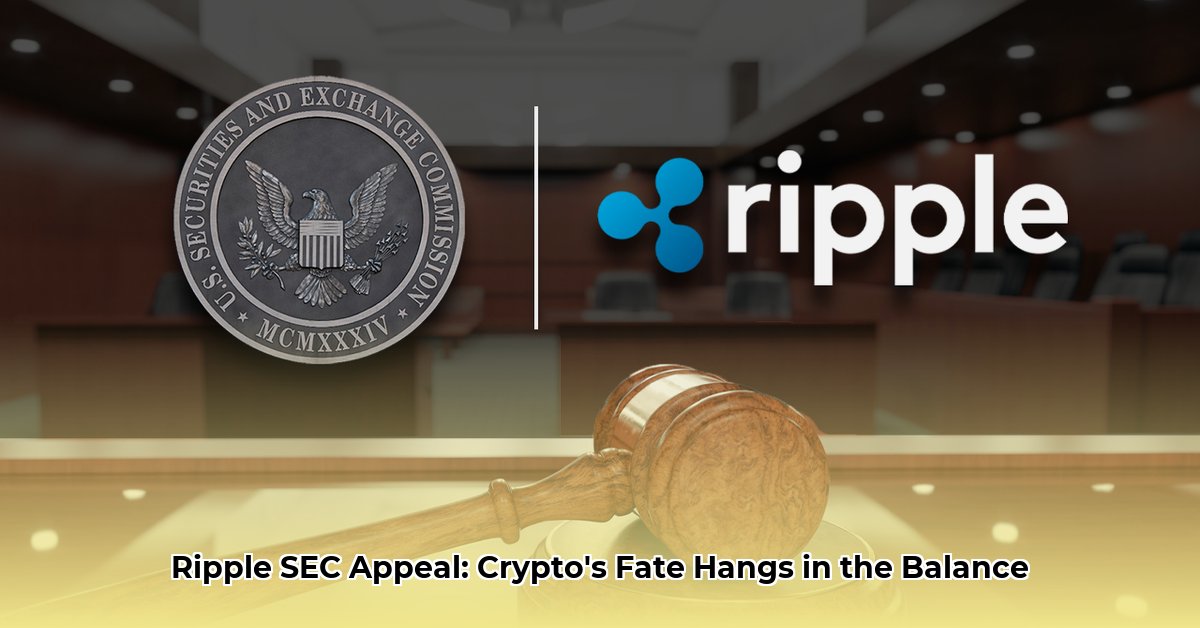
The Ripple-SEC Appeal: A Defining Moment for Crypto Regulation
The Ripple Labs vs. SEC case is reaching a critical juncture. The deadline for the Second Circuit Court of Appeals' decision on Ripple's appeal is fast approaching, carrying significant implications for the future of cryptocurrency regulation in the United States. This ruling will not only affect Ripple and its XRP cryptocurrency but also potentially set precedents for how all digital assets are classified and regulated. The ambiguity surrounding the definition of a "security" under US law is at the heart of this legal battle.
Defining "Security": The Howey Test and Crypto's Complexity
The core dispute centers on whether XRP constitutes a "security" under the Howey Test, a cornerstone of U.S. securities law. This test determines whether an investment involves an investment of money in a common enterprise with a reasonable expectation of profits derived from the efforts of others. The lower court's decision was nuanced, distinguishing between direct sales of XRP by Ripple and secondary market transactions. However, the SEC's appeal challenges this distinction, arguing that all XRP sales should be considered securities offerings. The decentralized nature of many cryptocurrencies complicates applying the Howey Test, making this case particularly challenging. The outcome will significantly impact the crypto industry's future.
Pivotal Points:
- The Howey Test's Applicability to Crypto: The court's interpretation of the Howey Test in the context of decentralized digital assets will profoundly shape future regulations.
- The Precedent Set by the Ruling: The decision will establish a legal precedent that other crypto projects and regulatory bodies will likely follow.
- Impact on Market Stability: The clarity (or lack thereof) provided by the ruling will significantly influence the stability and growth of the cryptocurrency market.
The Ripple Effect: Potential Outcomes and Their Ramifications
The potential outcomes of this appeal are far-reaching and unpredictable. A ruling against Ripple could set a precedent for classifying many other digital assets as securities, potentially leading to stricter regulation and a significant restructuring of the cryptocurrency market. Conversely, a ruling in favor of Ripple could bring much-needed clarity and potentially stimulate innovation. A partial ruling, upholding some aspects of the lower court's decision while overturning others, could create further uncertainty.
What Could Go Wrong? A negative outcome for Ripple could severely hamper innovation in the US crypto space, potentially driving development overseas. Conversely, an unclear ruling could create prolonged legal battles. Both scenarios pose risks to market stability and investor confidence.
Who is Affected?
This case extends beyond Ripple and the SEC. The impact will resonate across the entire cryptocurrency ecosystem:
- Ripple: The outcome directly influences Ripple's financial future and operational freedom.
- The SEC: The SEC aims to establish clear regulatory authority over the crypto market, regardless of the outcome.
- XRP Holders: The price of XRP will likely experience significant volatility depending on the ruling.
- The Crypto Industry: The entire industry awaits a clearer regulatory framework, irrespective of the decision's specifics.
Navigating the Uncertain Future: Strategies for Investors and Businesses
The uncertainty surrounding the appeal necessitates proactive risk management. Investors and businesses should consider the following strategic steps:
- Diversify your investments: Spread your holdings across different asset classes to reduce risk.
- Implement robust risk management strategies: Develop plans to mitigate losses from market fluctuations.
- Maintain awareness of regulatory developments: Stay informed about legal changes and their impact on your holdings.
- Engage with regulatory bodies: Participate in industry discussions and contribute to shaping future policies.
Mitigating Legal Risks: A Proactive Approach
Given the complexities of the Ripple-SEC case and the potential for further regulatory changes, a proactive approach to risk mitigation is essential. This requires:
- Thorough Due Diligence: Conduct extensive legal research before launching any cryptocurrency project. Consult with legal professionals specializing in securities law and blockchain technology.
- Expert Regulatory Consultation: Stay updated on evolving regulations; engage experts for guidance on legal compliance.
- Portfolio Diversification: Diversify your crypto holdings to limit losses from a single legal development.
- Transparency and Disclosure: Communicate potential risks clearly and openly with investors.
- Strategic Partnerships: Work with compliant platforms and exchanges to strengthen your regulatory compliance.
The Ripple-SEC appeal deadline marks a pivotal moment for the future of cryptocurrency regulation, calling for both careful observation and proactive decision-making by investors and industry stakeholders alike. The lasting effects of this ruling will undoubtedly shape the crypto landscape for years to come.